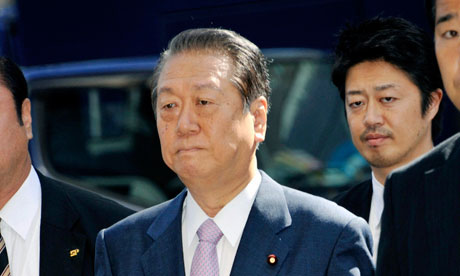Japan clears top politician Ozawa
Influential Japanese politician and backroom power-broker Ichiro Ozawa is found not guilty in a funding scandal.
小沢氏弁護に「無罪請負人」 検察側は刑事弁護ベテラン
小沢氏の裁判を担当するのは、東京地裁刑事11部。大善(だいぜん)文男判事(51)が裁判長を務め、平塚浩司(47)、井下田英樹(41)の両判事が横に並ぶ。
大善裁判長は1986年に任官。名古屋、高知、広島の各地裁などを経て、01年から司法研修所教官を4年余り務めた。06年から高松高裁事務局長を4年 務めた後、10年春に東京地裁の部総括判事に着任。裁判員裁判を多く手がけてきた。周囲の評価は「堅実で真面目な人」で一致する。
検察官役を務める指定弁護士は3人。中心の大室俊三弁護士(62)は、リクルート事件や、今年9月に無罪が確定した旧日本債券信用銀行の粉飾決算事件な どを担当してきた刑事弁護のベテラン。政治資金規正法に詳しい村本道夫弁護士(57)、山本健一弁護士(47)を加え、推薦した第二東京弁護士会は「政治 的な中立性を重視し、実務に徹して選んだ」という。
小沢氏弁護団は9人で構成し、主任は弘中惇一郎弁護士(65)だ。村木厚子・厚生労働省元局長が無罪となった郵便不正事件、故・三浦和義氏の「ロス疑 惑」事件、薬害エイズ事件などで無罪を勝ち取り、「無罪請負人」とも呼ばれる。長年、コンビを組んできた喜田村洋一弁護士(60)は、法廷で相対する大室 弁護士とは司法修習の同期で、旧知の仲という。
大善裁判長は1986年に任官。名古屋、高知、広島の各地裁などを経て、01年から司法研修所教官を4年余り務めた。06年から高松高裁事務局長を4年 務めた後、10年春に東京地裁の部総括判事に着任。裁判員裁判を多く手がけてきた。周囲の評価は「堅実で真面目な人」で一致する。
検察官役を務める指定弁護士は3人。中心の大室俊三弁護士(62)は、リクルート事件や、今年9月に無罪が確定した旧日本債券信用銀行の粉飾決算事件な どを担当してきた刑事弁護のベテラン。政治資金規正法に詳しい村本道夫弁護士(57)、山本健一弁護士(47)を加え、推薦した第二東京弁護士会は「政治 的な中立性を重視し、実務に徹して選んだ」という。
小沢氏弁護団は9人で構成し、主任は弘中惇一郎弁護士(65)だ。村木厚子・厚生労働省元局長が無罪となった郵便不正事件、故・三浦和義氏の「ロス疑 惑」事件、薬害エイズ事件などで無罪を勝ち取り、「無罪請負人」とも呼ばれる。長年、コンビを組んできた喜田村洋一弁護士(60)は、法廷で相対する大室 弁護士とは司法修習の同期で、旧知の仲という。
Japan's Ichiro Ozawa pleads not guilty to violating fundraising laws
Democratic party heavyweight denies wrongdoing and condemns trial as 'abuse of state power'
- guardian.co.uk,
-

Ichiro Ozawa enters Tokyo district court. His mastery of backroom deals has earned him the nickname Shadow Shogun. Photograph: Kyodo/Reuters
Japan's most controversial politician has pleaded not guilty to charges of violating fundraising laws. Ichiro Ozawa, 69, who has played a pivotal political role for four decades, most recently as powerbroker in the ruling Democratic party, said the charges appeared aimed at destroying him "politically and socially".
The trial comes after three former aides were found guilty last week of fundraising law violations and follows a series of political setbacks that suggest Ozawa's influence is diminishing.
The man credited by many for orchestrating the Democrats' historic victory in the 2009 election lost a party leadership race in 2010 to then prime minister Naoto Kan, and in June failed in his attempt to oust him in a no-confidence vote. A candidate backed by Ozawa to succeed Kan was then defeated by Yoshihiko Noda, a favourite of Ozawa's critics.
Political analysts say it may be too early to write off Ozawa as a spent force and Noda's appointments of Ozawa allies in cabinet and party posts attest to that.
In entering his not guilty plea at Tokyo district court on Thursday, Ozawa, whose mastery of backroom deals earned him nicknames of Prince of Darkness and Shadow Shogun, stayed true to his fighting style. "One can presume this is aimed at destroying me socially and politically. This is a clear abuse of state power," he told a panel of three judges.
The trial, expected to conclude in April, centres on charges that Ozawa allegedly oversaw false accounting by the body handling his political funds in a murky 2004 land deal.
He has denied wrongdoing and prosecutors had originally decided not to charge him due to lack of evidence, but that was overturned by a judicial panel of ordinary citizens, prompting an indictment in January. If found guilty, Ozawa faces up to five years in jail or fines of up to 1 million yen (£5,500).
"If found guilty, he would naturally find his influence weakening markedly. His intraparty group would start dissolving," said Tomoaki Iwai, political science professor at Nihon University. "Would his influence strengthen if found not guilty? I don't think that would be much of a help for him ... He just will not be able to stop his power from dissipating."
That might be good news for Noda's Democratic party, where Ozawa has been a divisive force, but a blow for those who think his talent for challenging the status quo is what Japan needs to snap out of its prolonged stagnation.
Ozawa, a former heavyweight in the conservative Liberal Democratic party, left the then ruling party in 1993 and for nearly two decades tried to build a viable alternative. He looked poised for the premiership in 2009 but had to step down as the Democrats' leader over the funding scandal just a month before the party's landslide election win.
The trial comes after three former aides were found guilty last week of fundraising law violations and follows a series of political setbacks that suggest Ozawa's influence is diminishing.
The man credited by many for orchestrating the Democrats' historic victory in the 2009 election lost a party leadership race in 2010 to then prime minister Naoto Kan, and in June failed in his attempt to oust him in a no-confidence vote. A candidate backed by Ozawa to succeed Kan was then defeated by Yoshihiko Noda, a favourite of Ozawa's critics.
Political analysts say it may be too early to write off Ozawa as a spent force and Noda's appointments of Ozawa allies in cabinet and party posts attest to that.
In entering his not guilty plea at Tokyo district court on Thursday, Ozawa, whose mastery of backroom deals earned him nicknames of Prince of Darkness and Shadow Shogun, stayed true to his fighting style. "One can presume this is aimed at destroying me socially and politically. This is a clear abuse of state power," he told a panel of three judges.
The trial, expected to conclude in April, centres on charges that Ozawa allegedly oversaw false accounting by the body handling his political funds in a murky 2004 land deal.
He has denied wrongdoing and prosecutors had originally decided not to charge him due to lack of evidence, but that was overturned by a judicial panel of ordinary citizens, prompting an indictment in January. If found guilty, Ozawa faces up to five years in jail or fines of up to 1 million yen (£5,500).
"If found guilty, he would naturally find his influence weakening markedly. His intraparty group would start dissolving," said Tomoaki Iwai, political science professor at Nihon University. "Would his influence strengthen if found not guilty? I don't think that would be much of a help for him ... He just will not be able to stop his power from dissipating."
That might be good news for Noda's Democratic party, where Ozawa has been a divisive force, but a blow for those who think his talent for challenging the status quo is what Japan needs to snap out of its prolonged stagnation.
Ozawa, a former heavyweight in the conservative Liberal Democratic party, left the then ruling party in 1993 and for nearly two decades tried to build a viable alternative. He looked poised for the premiership in 2009 but had to step down as the Democrats' leader over the funding scandal just a month before the party's landslide election win.
沒有留言:
張貼留言